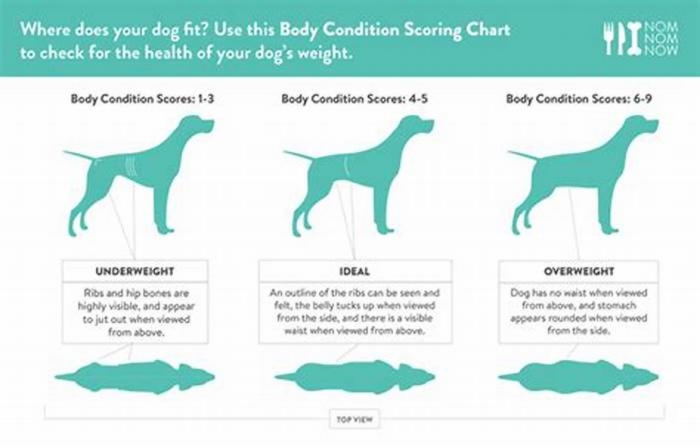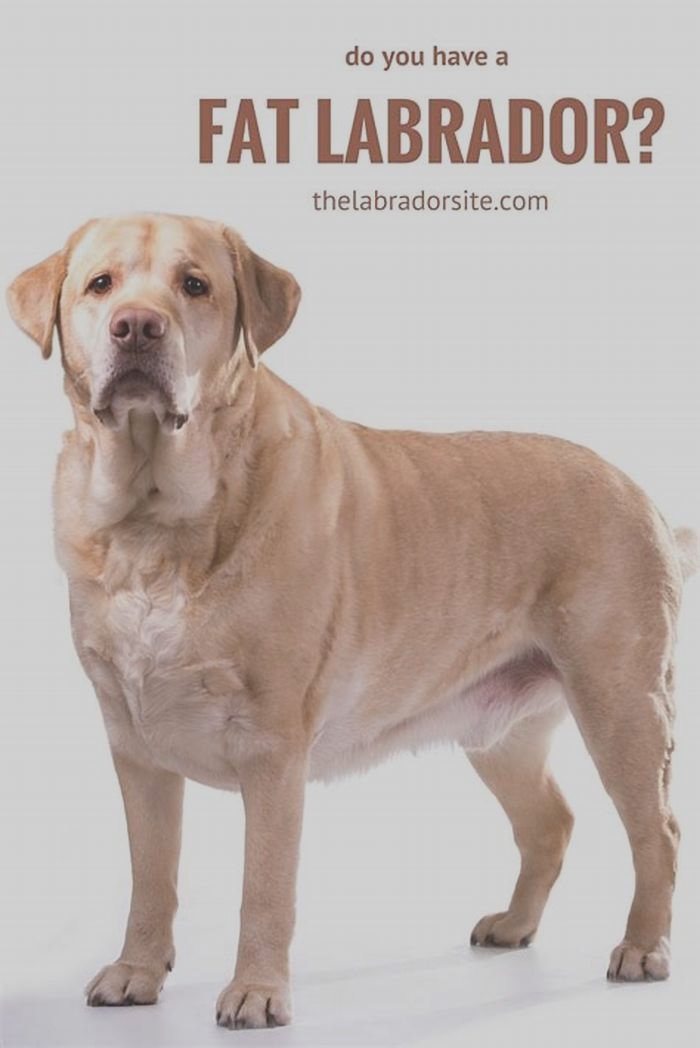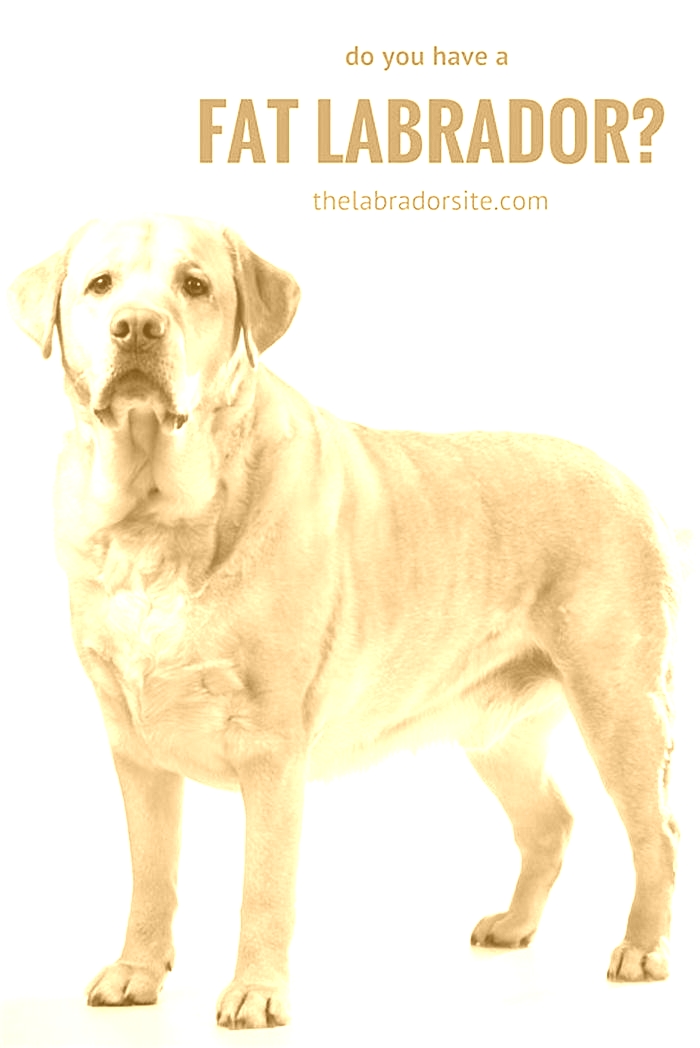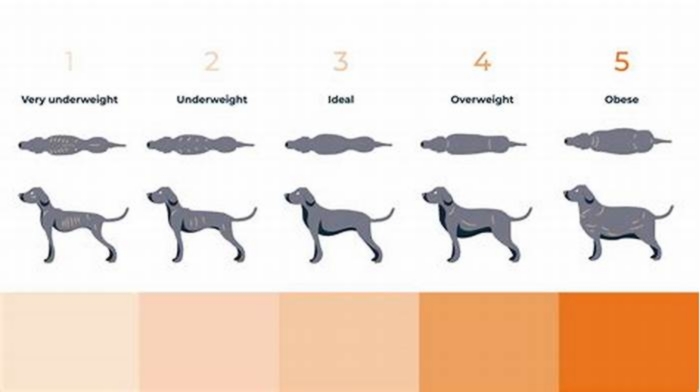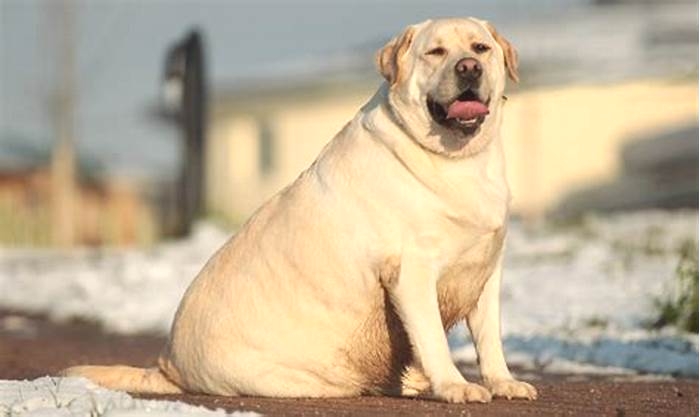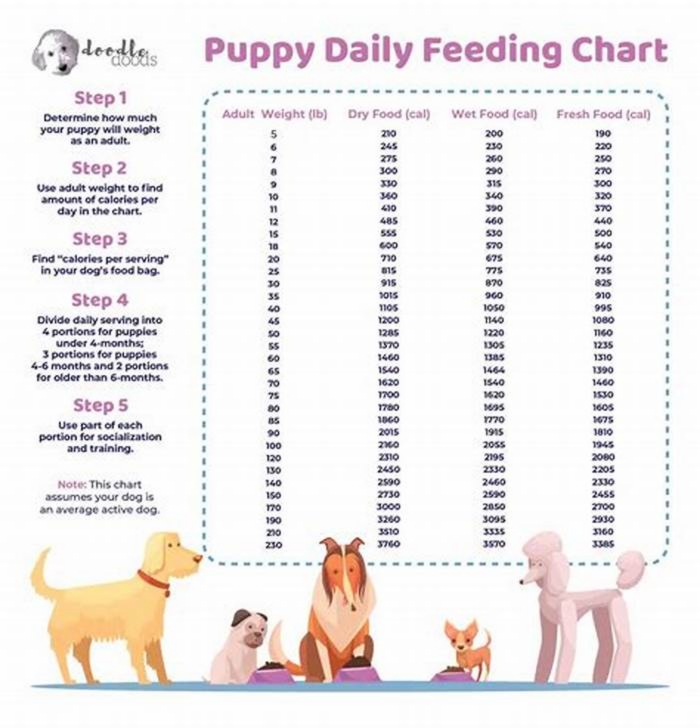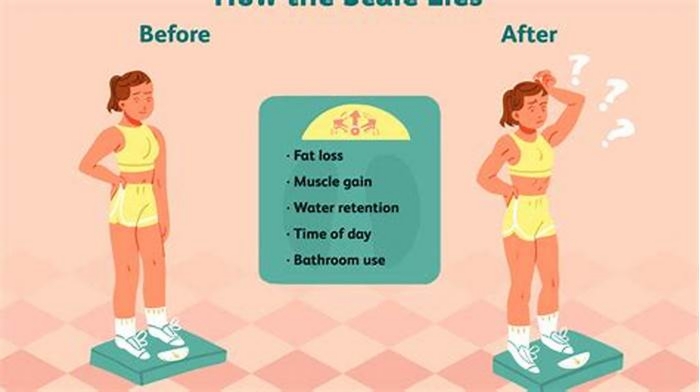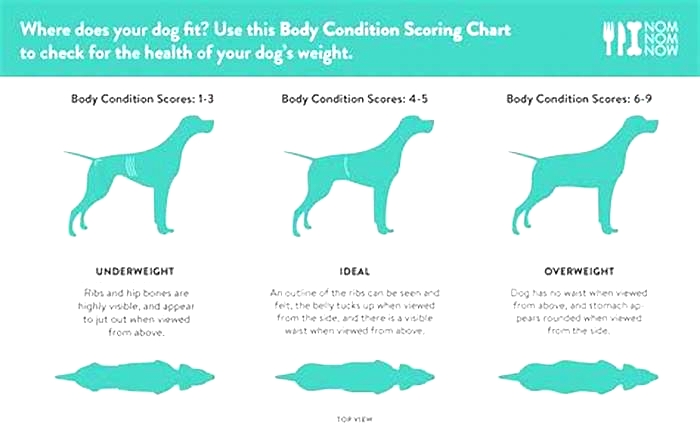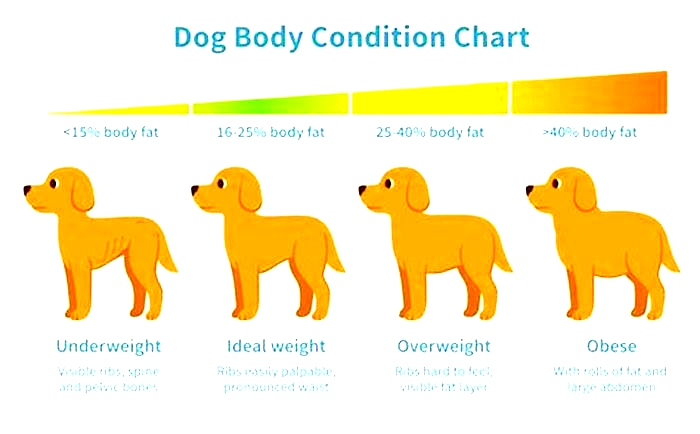What is considered overweight for a Labrador
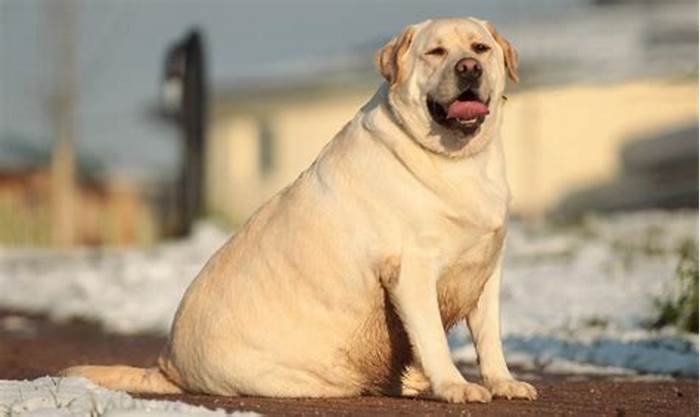
How To Tell If Your Labrador Is Overweight and what to do about it
Worried that your Labrador is overweight? Here are the signs that he might need to drop a few pounds, and some easy ways for you to help him lose weight. Todays guest post is by Kate OBrien from the Slimdoggy website
Labradors are known for their appetites. As a result of those healthy appetites and their ability to charm humans intofeeding them, they also are known for being a little chunky or in reality, overweight.
Labs are sporting dogs and are meant to run, swim, hunt and retrieve all day long. If your Labrador is overweight, you might worry that you are limiting his ability to do these things. In order to do that they must be healthy, strong and fit, not fat. Maybe you dont hunt with your Lab; many if not most Labs are family pets, but that doesnt mean they should be couch potatoes with an extra layer or two of fat.
A growing problem
Overweight dogs are a growing problem, pun intended. In the UK it is estimated that over one-third of all dogs are overweight1 and in the US, that figure rises to an astounding 54%.2 Labs are particularly susceptible to obesity and in the US, over 60% are overweight.
Why should we worry? What difference does it make if Buddy has a few extra pounds? Well, if you love Buddy and want him to live a long life, it makes a difference.
Weight and longevity
In the first-ever lifelong canine diet restriction study, a group of Labrador Retrievers was followed for 14 years, from birth until death.
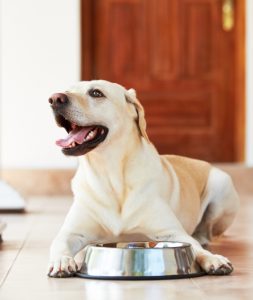 They found that a dogs median life span can be extended by 15%, nearly two years for the Labs in the study, by restricting their diet to maintain ideal body condition.3
They found that a dogs median life span can be extended by 15%, nearly two years for the Labs in the study, by restricting their diet to maintain ideal body condition.3
By keeping your Lab lean and fit you could extend their life for TWO YEARS. Thats a lot of extra time to spend with your best friend.
A lean dog also has fewer health and joint problems. Labs have a natural propensity for hip and elbow issues but keeping them fit helps keep arthritis at bay. Other serious diseases linked to being overweight include cardiovascular disease, kidney disease, and some forms of cancer.
Is my dog too fat?
Convinced you want to keep your dog fit, but dont know how to tell if they are at the proper weight? You are not alone. In the same survey from PDSA, they report that only 17% of owners look at body shape and weight before deciding how much to feed their pet, and 85% of vets say owners have no idea of healthy body shape for their pet.4
We wanted to offer a few suggestions to help you assess the body condition of your Lab.
- The first thing is to have an honest look at them. There are numerous body conformation charts for dogs you can use as a guide. We provide links to several different at the end of this article. Whichever chart you prefer, they all depict a waistline when looking at your dog from above and a slight tuck up behind the ribs. Take that guide and go look at your dog.Many folks argue that a Lab isnt supposed to have a tuck or a waist, but that standard is for show Labs and lets be honest, some of those show dogs are overweight. The reality for most of you is that your dog isnt a show dog, so having a tuck and being leaner than the show dogs you see on TV is better for their health and longevity.
- The second evaluation you can perform is whether you feel their ribs when you run your hands lightly over the sides of your dog. Note I said lightly, you shouldnt have to press in; you should easily feel them. Actually seeing the ribs of your Lab might mean your dog is too thin, so be careful of that as well.
- The scale is the third tool to use in your assessment. Weigh your dog and ask your Vet about their weight. Many vets are reluctant to bring up the subject of your pet being overweight, but if you express your concern, they will most likely give you an honest assessment. Be open to what they say.
What should he weigh?
The average Lab will weigh somewhere between 60-85 lbs or between 27-30 kgs. Use this range as a guide but be aware that some Labs with smaller or larger bone structures can be outside of the range and still be perfectly fit and at their optimal weight. Once you have an idea of whether your Lab is overweight or not, what do you do if they are?
Feeding for health
First and foremost, you have to educate yourself about what you are feeding your dog. Reading the dog food label and following what it says doesnt work. Those labels dont take into account the current condition of your dog, their age or their exercise level, all of which are important factors in how much your dog should eat each day. And they clearly dont take into account those extra treats you give your dog!
Most people dont properly measure their dogs food or even know how many calories are in the food they give them each day.
What about exercise?
Do you have any idea how many calories your dog burns each day? How can you figure out how many calories they need to eat if you dont know how many they burn? Too much work you say, just throw a scoop or two (or three) of food in the bowl and be done with it? Thats how you end up with an overweight and unhealthy Lab.
Theres an app for that!
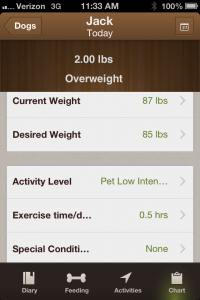 Figuring this out really isnt as hard as it sounds because, of course theres an iPhone APP for that.
Figuring this out really isnt as hard as it sounds because, of course theres an iPhone APP for that.
The SlimDoggy App is a simple App with a Daily Diary that allows you to look up and track all of this information for your dog. Like a Runkeeper and Weightwatchers for dogs, the App provides average daily calorie expenditures for a dog as well as calories burned through various types of exercise. It also has a database of over 2,500 dog foods and treats.
The Diary feature allows you to create a diary for your dog and calculate exactly how much they should be eating based on their daily exercise. The food database helps you pick the healthiest diet and the proper amount of food to feed them each day.
Dont have an iPhone? No problem, visit the SlimDoggy website and use the Calorie Widget. Soon we will have a full version of the App available on the website too! There are no excuses now.
Lets have healthy labs!
We all love our Labs and we want them to be in our lives for as long as possible and we want them as healthy as possible. Dogs dont have opposable thumbs, they cant feed themselves, and it is our responsibility to feed them a healthy nutritious diet of the proper proportions so that they are lean, fit and healthy. And then instead of giving them a treat, take them for a walk that is the best way to show your Lab you love them.
Kate OBrien and her husband, Steve, live in Camarillo, CA, with their dogs SlimDoggy Jack and Maggie May, senior Lab rescues. They are animal advocates and are active in the dog rescue and foster community. They write about their adventures with their dogs and about pet obesity, health, and fitness on theSlim Doggy website,Facebook, and Twitter.
Kate has had dogs in her life since she was a child, including the collies her grandfather used to breed and show. Allergies interfered, but then in adulthood Kate was able to bring dogs back into her life. Shes had numerous Labs, a couple of litters of puppies and many Lab fosters. Shes been able to share her love of exercise and fitness with her dogs and they inspire her to help other learn about better health, nutrition & fitness for their dogs.
FURTHER RESOURCES:
FOOTNOTES
1 PDSA Animal Wellbeing Report The State of Our Pet Nation, 2013
2 Association for Prevention of Pet Obesity Annual Survey Report 2012
3 Effects of diet restriction on life span and age-related changes in dogs, Kealey, Richard et.al., JAVMA Vol 220, No. 990, May 1, 2012
4 PDSA Animal Wellbeing Report The State of Our Pet Nation, 2013
More information on Labradors
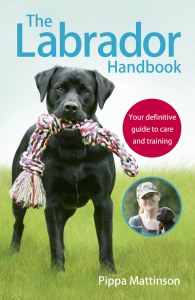 (paid link)You can find out more about how to keep your Labrador as fit and healthy as possible in the Health section of our website.
(paid link)You can find out more about how to keep your Labrador as fit and healthy as possible in the Health section of our website.
 (paid link)
(paid link)If youd like all of The Labrador Sites best information together in one place, then get your copy of The Labrador Handbook today.
The Labrador Handbook looks at all aspects owning a Labrador, through daily care, to health and training at each stage of their life.
The Labrador Handbook is available(paid link) worldwide.
The Labrador Site Founder

Pippa Mattinson is the best selling author of The Happy Puppy Handbook, the Labrador Handbook, Choosing The Perfect Puppy, and Total Recall.
She is also the founder of the Gundog Trust and the Dogsnet Online Training Program
Pippa's online training courses were launched in 2019 and you can find the latest course dates on the Dogsnet website
Why Are Labradors Prone to Obesity? (2024)
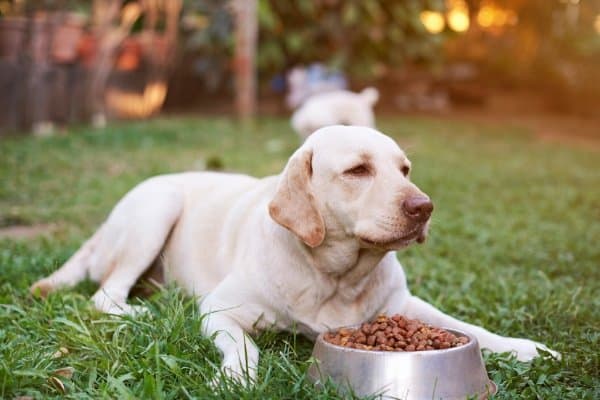
According to a recent survey, a whopping 56% of American dogs are overweight or obese. That equates to approximately 50 million dogs with a weight issue.
Surprisingly, according to the same survey, only 15% of dog owners routinely weigh their pet every month, even when dealing with obesity issues. Perhaps even more shocking, by the age of 6 months, 21% of dogs are already overweight, setting themselves up for a lifelong battle against the bulge.
For nearly 30 years, Labrador Retrievers have topped the popularity charts, but theyre also one of the most likely breeds to struggle with their weight. Lets find out why.
Why are Labradors prone to obesity? In addition to lifestyle-related causes, a variant of a gene that regulates a feeling of fullness after a meal is found in approximately one-fourth of Labradors. This variant causes affected Labs to still feel hungry even after eating and is directly associated with obesity.
Obesity can have a devastating impact on your Labs health. Knowledge is power, right? So lets jump right in and take a closer look at this common Labrador issue.
Why Are So Many Labradors Overweight or Obese?
Gulping down entire meals without chewing and then begging for more, constantly scavenging for a free meal, being obsessed with food, and rummaging through the garbage for a tasty morsel. These are all very common Labrador behaviors.
If youve noticed that your Lab seems to be hungry all of the time and is becoming larger by the day, youre not alone. Most Labs are incredibly food motivated and can easily grow too heavy.
Generally, when a dog is 15% or more over the ideal weight for his breed and sex, he is considered overweight, but once he surpasses 30%, he is obese. Both of these conditions can occur when the amount of energy (in the form of food) consumed is greater than the amount of energy expended.
So why do Labs seem to struggle more with this issue than other breeds? Well, new-found scientific evidence suggests the answer might be genetic.
A gene called pro-opiomelanocortin (POMC), which has been found to be linked to appetite, weight, and satisfaction after eating, lacks 14 base pairs in about of all Labrador Retrievers (and Flat-Coated Retrievers too).
Scientists discovered that the more copies of this gene variant a dog has, the more likely the dog is to become overweight and obsessed with food. In fact, dogs with just one copy of this variant were on average 4 pounds heavier than normal.
This POMC variant compromises the dogs ability to feel full and satisfied after a meal, leaving him feeling hungry all of the time. This explains why so many Labradors are intensely food motivated (which does make training quite easy) and have a desire to eat that far exceeds their actual nutritional requirements leading to obesity.
Other Factors That Contribute to Labrador Obesity
Aside from genetic factors, Labs have several other factors working against them when it comes to maintaining an ideal weight.
Diet
Admittedly, its hard to say no to a Labs smiling face and imploring eyes when it comes to food, but overfeeding is one of the most prevalent contributors to fat Labs. In fact, just a few extra pieces of kibble every day can turn into several extra pounds of body fat over the course of a year.
Offering too large of meals isnt the only problem though, as feeding snacks, dog bones, and tidbits of people food throughout the day can quickly equate to added weight as well.
In addition to a lack of portion control, feeding the wrong kind of dog food can also lead to weight gain. Rich diets loaded with fat and excess calories or poor-quality kibble packed with empty calories can both enable your Lab to pack on extra pounds.
Sterilizing
When a dog is spayed or neutered, the consequent hormonal changes result in a slower metabolism and an increased appetite. If, after surgery, adjustments are not made to the dogs diet or exercise time, weight gain may occur easily, especially during the two years immediately following the procedure according to the National Center for Biotechnology Information.
Lifestyle
Another major contributor to Labrador weight gain is the fact that the vast majority of these active dogs are not routinely doing what they were bred to do. Remember, the Labrador was created to spend long hours working alongside Newfoundland fishermen in harsh conditions and frigid waters. Those working dogs had hearty appetites but quickly burned off extra calories each day through hard work.
Today, many Labs are not given the opportunity to exercise as they should. No long hours hunting and retrieving in the field, no days spent plunging into the water to bring back downed game. The result? Extra pounds accumulate.
Age
As dogs age, they tend to naturally slow down, just like people and will spend more and more time resting and sleeping as they ease into old age. Many owners find that this is the time when their once-trim Labrador becomes a little too hefty.
Health Conditions
Certain health issues, such as hypothyroidism or Cushings disease, can cause unexpected weight gain and lead to obesity if not properly treated. Before any weight-management program is started, a check-up by your veterinarian is recommended to rule out any underlying diseases or disorders.
How to Tell If Your Lab Is Overweight
Its a wise idea to evaluate your Labs weight once a month or so and it only takes a few moments to complete. Of course, you could bring him by your vets office to be weighed, but a visual check and quick feel of his bones can easily be done right at home.
View your Lab from directly overhead and from the side while he is standing up, and run your hands down his spine, over his ribcage, and across his rump, prodding gently with your fingertips for the rib, spine, and hip bones.
Signs of an overweight Labrador include:
- No noticeable indentation at the waist is present when viewed from above.
- Belly hangs down and there is no slight upward slant of the abdomen from the ribcage toward the hips.
- The rib and hip bones and the knobs of the backbone are difficult to find by gentle probing or cant be felt at all.
- Rolls of fat are present or dog appears bloated.
Dangers of Obesity
High blood pressure, joint issues, osteoarthritis, diabetes, kidney disease, respiratory troubles, heart disease, cancer, and a general decreased quality of life are all associated with obesity. Sound familiar? These same dangers plague people struggling with obesity as well.
How to Help Your Overweight Lab Lose Weight
An ounce of prevention is worth a pound of cure, but if your Lab is already on the pudgy side, you need to take action now.
The first step in reducing your Labs weight should be a trip to the vet to ensure that there arent any major health issues to deal with first. While there, ask your vet to calculate the correct amount of daily calories your dog should be eating so that you can make adjustments right away.
Also ask about replacing a portion of his regular meals with an equal amount of canned green beans to decrease calorie consumption or switching to a kibble formulated for weight management.

In place of his usual snacks, offer only healthy treats like a baby carrot, a few blueberries, or an apple slice, and practice tough love when he looks at you like hes starving.
Gradually increasing the amount of your Labs daily exercise is key to shedding extra weight. Dont just teach him to walk on a treadmill (although you can), but make each exercise session a fun bonding opportunity.
Dinnertime can also be used to increase physical activity if instead of placing his food in a bowl, you hide it within a snuffle mat or make a trail of kibble winding through your backyard.
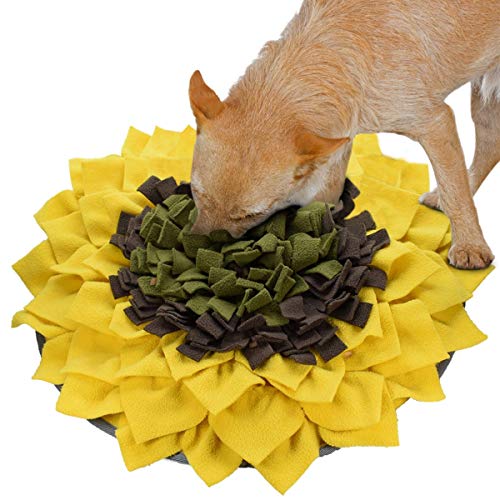
These activities will get him moving, slow his eating down so his tummy has a chance to realize that its full and will provide mental stimulation.
Last update on 2024-04-26 at 03:24 / Affiliate links / Images from Amazon Product Advertising API

